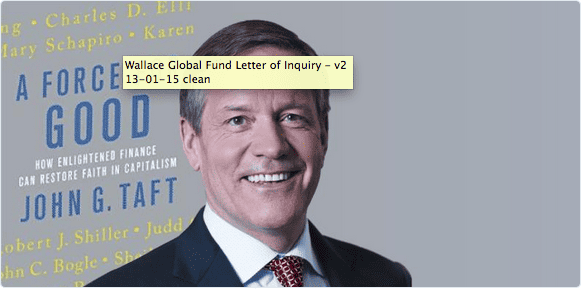The following post was adapted from a chapter I wrote for John G. Taft’s new book, A Force for Good, published just this past week by Palgrave Macmillan. John is the CEO of RBC Wealth Management, and I am proud to be in the illustrious company of individuals like Mary Schapiro, Robert Shiller, Sheila Bair, Roger Martin, and Dominic Barton, who were invited by John to contribute to this book. I think you will find A Force for Good a fascinating read as it explores, from a variety of experienced perspectives, how the financial industry can marshall, for the long-term public good, the creative energies and brainpower it has deployed in the past to develop derivatives, high-frequency-trading technologies, and other engineering complexities.
In 2011, the Economist declared that civilization had entered into what is known as the Anthropocene era – a geologic period in which human activity is altering the health of Earth. The piece contended that if we continue to operate as we have, we will cause irreversible damage to the life-supporting systems of the planet. What the Economist failed to point out, however, was the critical role that finance plays in shaping this outcome. Our relentless pursuit of the exponential growth of financial capital, hardwired into our economic system, will bring us to the brink of collapse if we don’t change course. Science tells us that our planet, along with all of its complex, interconnected biochemical systems that enable life to exist, are fixed in scale. Yet our dominant economic theories assume that our path to prosperity requires limitless, undifferentiated, exponential growth of the economy’s metabolism – defined as raw materials in and waste materials out. The emergence of the Anthropocene era requires a seismic shift in our economy. We must transition to a more sustainable and inclusive economic system that serves the needs of people while respecting the earth’s physical limits. The financial crisis of 2008-09 provided us with the perfect impetus for this shift, prompting even mainstream economists to question as never before the very foundations of our finance-driven economic system. What they and policymakers should consider is a holistic approach that takes a deeper look into the practice of finance, and in particular, long-term decision making that affects the flow of trillions of dollars of real investment in the decades ahead. In this, the Anthropocene era, large-scale investment decisions simply must be considered a vital part of the public interest and on the agenda of an informed, democratic process. The top 1,000 global corporations represent half of the total market value of the world’s 60,000 public companies and, undoubtedly, an even greater share of capital investment budgets. What demands our attention, therefore, are the decades-long impacts of the capital expenditure decisions these larger corporations make. The same goes for the impacts of large government capital expenditures like investments in infrastructure. Corporations generally make their investment decisions using an internal rate of return framework that compares a project’s expected financial return with the firm’s cost of capital. Concerns about the systematic impact on social and natural capacity rarely enter the analysis. That must change. There are three possible paths – all interconnected – to prompt that shift:
- We can work within the existing economic paradigm to shift the flow of investment by making commercial enterprises begin to pay the true social and environmental cost of their operations and by subsequently passing those costs on to consumers;
- Business, government and large pools of private capital can begin leading, through enlightened real investment in resource productivity and alternative energy to save money and accelerate the shift to a Regenerative Economy; And
- The public can demand a new set of rules and regulations – some local, some regional, some global – to establish the necessary guardrails and mandates to force the transition.
That said, the scale and complexity of the necessary shift in thinking is unparalleled and time is not on our side. No economic system in the history of civilization has ever had to contemplate such a restraint. But the sooner we acknowledge the implications of this immense challenge, the better.


